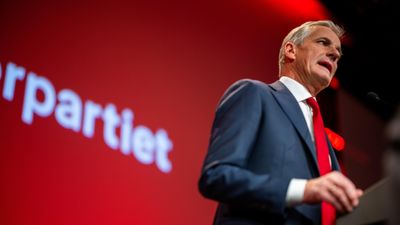What We’re Watching: Left wins Norway’s climate vote, everyone wants India’s jabs, junta denied Myanmar’s UN seat
Norway's climate election result: Most votes have now been counted from Norway's parliamentary election, and the left-leaning Labour party, headed by former FM Jonas Gahr Støre, has reaped 46 out of 168 seats up for grabs, ousting the conservative government led by PM Erna Solberg. Støre will now try to form a coalition government that's expected to include the agrarian Centre Party as well as the Socialist Party. The election was broadly seen as a referendum on climate change policy, given that oil accounts for more than 40 percent of Norway's exports and employs 7 percent of the entire workforce — though Norway itself has rolled out an ambitious green agenda at home. Støre says that he'll limit new oil explorations, but has ruled out getting rid of fossil fuels, saying that oil revenues could help fund the transition away from oil in the long run. Importantly, the Greens, the only political party that called for an end to all oil exploration, reaped only 4 percent of the vote, and is therefore unlikely to yield enough (or any) influence. Regardless, Støre may need to incorporate some smaller left-wing parties in his coalition that could force him to take a more forceful stance on climate change, like raising carbon taxes.
India pushed to vax the world: As the brutal COVID wave that devastated India in the spring now recedes, Delhi is coming under pressure to lift its vaccine export ban and deliver doses to low- and middle-income countries. The COVAX scheme was relying on India's Serum Institute to provide the bulk of its supply by administering 2 billion doses by the end of this year, but will now come up short — in part because when things got bad in India, the government stopped shipping pledged doses of the AstraZeneca shot saying that it needed to prioritize the domestic need. But now that India is recording one-tenth of the daily COVID cases it reported in early May, and at least 40 percent of its 1.4 billion people have gotten one jab, the World Health Organization and the US want India to resume exports. That may be a hard sell for the Biden administration, which enforced its own export ban earlier this year until it had enough supply for all Americans. Before the ban, India had sold or exported 66 million doses, but Biden is now pushing all countries to donate, not sell, any surplus supplies.
No UN seat for Myanmar's junta: The US and China cut a deal to block Myanmar's junta from taking the country's UN seat before the 76th UN General Assembly kicks off on Tuesday. But there's a catch: Myanmar's current UN envoy, appointed by the government the generals ousted in a coup last February, will have to tone down his fiery anti-junta rhetoric. The agreement is a slap in the face for Myanmar's military rulers, who were likely hoping China, one of their few friends, would push harder to give them the UN seat and the international legitimacy that comes with it. More broadly, it's a sign of what might be in store for the Taliban, who are also vying for international recognition and counting on China's support at international forums. However, the Taliban may have a slightly stronger claim because unlike Myanmar, the previous government has absconded and is not contesting their takeover. Still, having a Taliban representative on the Commission on the Status of Women, where Afghanistan won a seat in 2020, will surely be a non-starter for Western member states that have influence at the UN.
